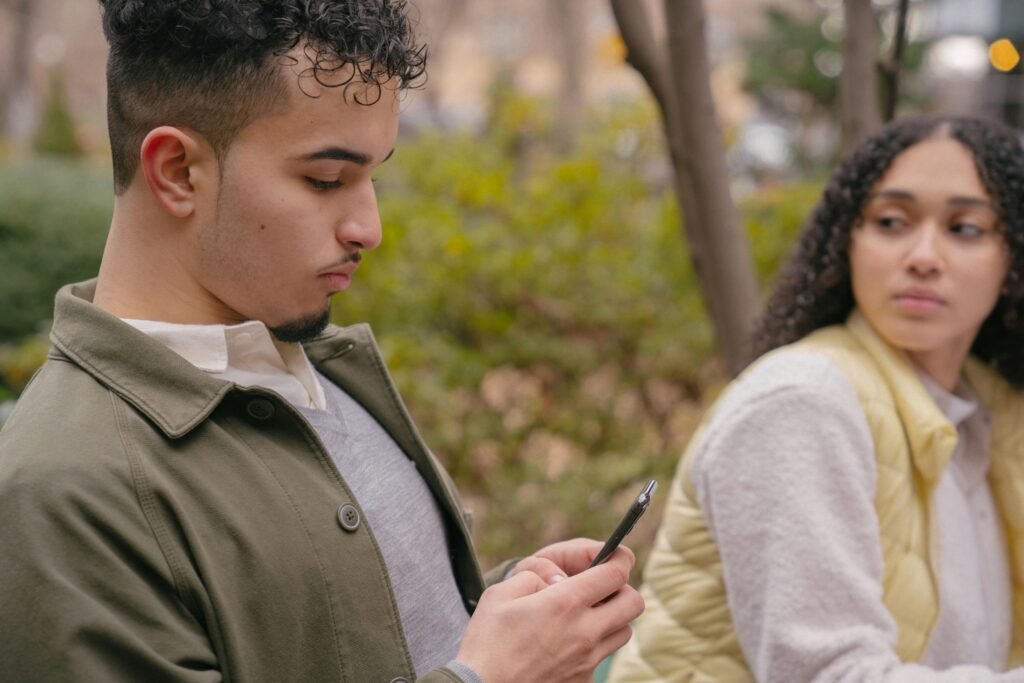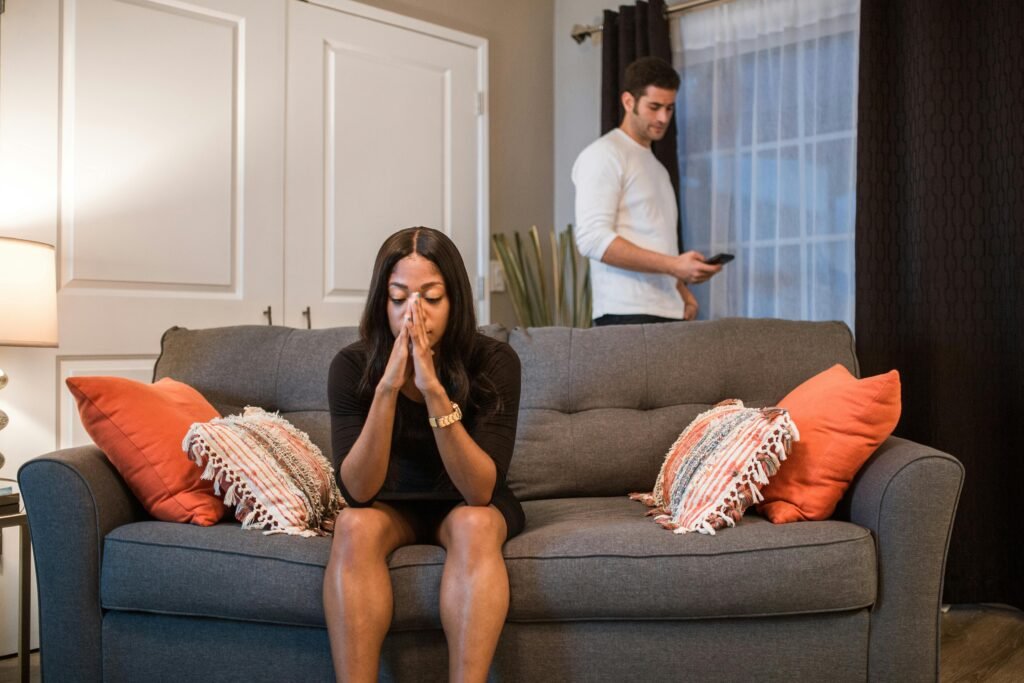
Recognizing Your Feelings
Figuring out your feelings can be confusing, especially when it involves a friend.
Start by thinking about what’s changed.
Do you notice yourself wanting to spend more time with them, or do you feel different when you’re around them?
Maybe you’ve caught yourself thinking about them in a way you didn’t before.
That little shift from “they’re great to talk to” to “I wonder if they feel the same” could mean there’s more going on.
It’s also important to check in with yourself and see if this is a genuine connection or just a passing crush.
Maybe something happened recently; like a fun trip together or a deeper conversation, that made you see them differently.
That’s totally normal, but it helps to dig into those feelings a bit.
Is it about who they are, or is it the idea of being with someone familiar and safe?
Sometimes, thinking about how you’d feel if they started dating someone else can give you clarity.
Would it bug you, or would you feel genuinely happy for them?
That might tell you more about whether this is love or if you’re just caught up in the moment.
It’s okay to not have all the answers right away; feelings can be messy, and that’s fine.
Evaluating the Situation

Taking a good look at your friendship before doing anything is super important.
Think about how long you’ve been friends and how close you actually are.
If you’ve been through thick and thin together, that’s a strong base to build on.
But if your friendship is more casual, it might not be the right time to shake things up.
Also, ask yourself how they might see this shift; do they seem open to deeper emotional connections, or do they value keeping things strictly platonic?
It’s worth noting that two-thirds of romantic relationships begin as friendships, which is a good sign that what you’re feeling isn’t all that unusual.
Actually, 47% of university students prefer to initiate relationships this way, so it’s not like you’re alone in thinking this could work.
That said, every friendship is different, so you’ll need to weigh the pros and cons for your specific situation.
One thing to really think about is how your confession might change things between you two.
There’s always a chance they might not feel the same, and it’s fair to wonder how that could affect the friendship.
Would you both be able to move past it, or is there a risk it could create some distance?
On the flip side, if they do feel the same way, what’s the best way to handle that shift?
Are you ready for the changes it might bring, both good and awkward?
It might also help to consider your friend’s current situation.
Are they seeing someone, getting over someone, or dealing with something else that could impact how they receive your feelings?
Timing matters more than you might think, and being mindful of what’s going on in their life shows that you care about more than just your own emotions.
The goal here isn’t just to make a move, but to do it in a way that respects your friend and the bond you already share.
Talking to someone you trust about this can give you a clearer picture of what to expect.
Maybe a mutual friend has insight on how your friend views you, or maybe they can help you figure out if this is worth pursuing at all.
But keep in mind that at the end of the day, only you really know what’s best for you and your friendship.
Communicating Your Feelings

Telling a friend you’ve caught feelings isn’t exactly easy, but keeping it bottled up can make things more complicated.
Start with choosing the right time and place.
You don’t want to bring this up in the middle of a group hangout or when they’re stressed out about something.
Pick a moment where it’s just the two of you, and the vibe feels comfortable enough for an honest talk.
When you do bring it up, keep it simple and direct.
Something like, “Hey, I’ve been thinking about this a lot, and I feel like I need to be honest with you” can set the tone.
You don’t need to pour your heart out all at once; ease into it.
Mention how much you appreciate the friendship first, so they know you value what you already have.
Then, let them know how your feelings have changed.
You can say something like, “I’ve started seeing you differently, and I wanted to share that with you because it feels important to me.”
It’s also really helpful to be clear about where you’re coming from.
Are you hoping to explore the idea of a relationship, or are you just sharing your feelings to be honest and let it off your chest?
Letting them know your intentions can help avoid confusion.
For example, if you’re open to more but also okay with staying friends, it’s good to say that upfront.
They’ll appreciate knowing you’ve thought this through and aren’t just acting on impulse.
Be ready to give them space to process. They might not have an immediate answer, and that’s okay.
Don’t rush to fill any silence; they might need time to figure out how they feel or how to respond.
A lot of the time, their reaction will depend on their own feelings about you, but also on timing and other stuff they’re dealing with.
So, give them the chance to really think it over without feeling pressured.
One thing to keep in mind is to avoid overloading them with expectations.
It’s fine to hope for a certain response, but don’t make it feel like they have to match your feelings just because you’re putting yourself out there.
Let them know that no matter how they feel, you’re glad to have them in your life.
This can help take some of the pressure off the conversation and keep things less awkward.
Body language matters, too.
Try to stay calm and open; it can help them feel more at ease.
If you look super nervous or tense, they might pick up on that and feel more anxious themselves.
Taking a deep breath before speaking and keeping your tone steady can make a big difference.
Finally, be prepared for any kind of response.
They could say they feel the same way, they could need time, or they might not feel the same.
Whatever happens, just hearing them out and showing respect for their feelings is important.
Sometimes, it’s less about the outcome and more about knowing you were honest with someone who means a lot to you.
Handling Rejection

Rejection sucks; it’s just a fact.
But it doesn’t have to be the end of the world or your friendship.
First off, let yourself feel whatever comes up.
Sad? Frustrated? Embarrassed?
That’s all normal.
Don’t push those feelings away or act like they don’t exist.
Give yourself permission to have a bad day (or a few).
Emotions don’t just disappear overnight, and that’s okay.
What really helps is taking a little space if you need it.
It doesn’t mean ghosting your friend or cutting them off entirely, but stepping back for a bit can make things less awkward and give you time to sort out your head.
If seeing them right away feels too hard, focus on other friendships or hobbies for a while.
It’s not about avoiding them forever; it’s about creating a little room to heal.
Keeping busy can help shift your focus.
Go for a run, binge that show you’ve been meaning to watch, or finally try that thing you’ve been putting off.
It doesn’t have to be deep or meaningful, just something that reminds you there’s more to life than this one situation.
Plus, doing stuff you enjoy can make you feel more like yourself again.
If the idea of staying friends feels doable, set some boundaries to make it work.
That might mean skipping the one on one hangs for now or not talking about dating for a while.
Be real with your friend about what you need, but also try to understand what they might need too.
Navigating this is tricky, so it’s all about being honest and finding a balance that works for both of you.
And let’s not sugarcoat it; there’s a chance things might feel different for a bit.
That’s just part of it. Friendships evolve, and sometimes they go through awkward patches.
That doesn’t mean you’ve ruined everything.
Over time, if you both put in the effort, the friendship can find its rhythm again.
It’s worth remembering that rejection isn’t some grand statement about who you are as a person.
It doesn’t mean you’re not good enough or that you’ll never find someone who feels the same.
It just means this particular situation didn’t pan out the way you hoped.
People’s feelings are complicated, and most of the time, it’s more about where they’re at than anything you did or didn’t do.
Sometimes, talking it out with someone else can give you a fresh perspective.
Maybe that’s a close friend, a sibling, or even a therapist.
They can help you process everything without the pressure of keeping it all inside.
Saying things out loud can feel like a release and might even help you figure out your next steps.
It’s tough to put yourself out there, and getting rejected is hard to deal with, no matter how strong you are.
But the fact that you were brave enough to open up says a lot about you.
It’s a sign of growth, and while it doesn’t feel great right now, it’s an experience that’ll make you stronger in the long run.
Building a Relationship

If your friend feels the same way, that’s an amazing start, but don’t rush into anything.
Take some time to figure out how to navigate this new territory together.
Shifting from friends to something more means some dynamics are going to change, and that’s normal.
What’s cool about starting as friends is you already know each other on a deeper level; there’s less of that awkward getting to know you phase that can happen in other relationships.
The big thing here is communication.
Be open about your expectations and talk about how you both see this relationship evolving.
Things might feel a little weird at first, but that’s just part of adjusting.
Keep doing the things you already enjoy together, whether that’s bingeing your favorite shows or grabbing coffee at your go to spot.
Familiar routines can make the transition feel less intimidating.
Since you’ve already built a solid friendship, you have the advantage of knowing each other’s quirks and habits.
That kind of foundation can help make things feel more natural as you explore this new chapter.
21.90 months as friendships before becoming romantic, gives you a head start in understanding how you click as a team.
It’s also key to set some boundaries early on.
Just because you’re dating now doesn’t mean you need to spend every second together.
Respecting each other’s space and individuality can keep the relationship healthy and balanced.
Keep the same energy you had when you were friends; sometimes the little things, like inside jokes or shared playlists, can mean even more now.
One thing to watch out for is managing expectations.
It’s easy to assume everything will stay the same as before, but romantic relationships come with their own set of challenges.
Be patient as you both figure out how to handle those changes.
Checking in with each other from time to time can help make sure you’re both on the same page.
What makes this kind of relationship special is the shared history.
You’ve already been there for each other through ups and downs, and that connection doesn’t just go away.
It’s a huge advantage when you’re building something deeper.
Keep being there for each other, just like you were as friends, and you’ll likely find that this new dynamic only strengthens your bond.
When to Seek Support

Sometimes navigating the shift from friendship to something more can feel like a lot to handle on your own.
It’s totally okay to ask for a little backup if you’re feeling stuck or unsure.
Talking to someone you trust; like a close friend, sibling, or even a mentor, can give you a fresh perspective.
They might have been through something similar or just have a way of helping you see the bigger picture.
Sometimes, just saying things out loud can help sort through all the emotions swirling around.
If things feel extra heavy, it’s worth considering reaching out to a therapist or counselor.
They’re pros at helping untangle complicated feelings and figuring out how to move forward without losing your sense of self.
Plus, they can help you handle any awkwardness or uncertainty in a way that feels healthy and balanced.
Therapy isn’t just for when you’re going through a crisis; it’s a great tool for understanding yourself better and finding clarity.
It’s also helpful to lean on your broader support network when things get tricky.
Maybe you have a group chat with friends who always keep it real, or a family member who gives solid advice without being overly pushy.
While everyone’s experience is different, hearing how others have dealt with similar situations can make you feel less alone.
Just be mindful about who you choose to open up to; someone who respects your privacy and won’t turn your story into gossip is key.
If you’re worried about overthinking everything or second guessing your feelings, having someone to check in with can help ground you.
They might point out things you’ve overlooked or help you reframe the way you’re looking at the situation.
For example, if you’re nervous about how your friend will react, someone else might remind you of their caring side or help you practice what to say.
On the flip side, be careful about getting too many opinions.
It’s easy to feel overwhelmed when everyone has their own take on what you should do.
At the end of the day, it’s your friendship and your feelings; you know them better than anyone else.
Use advice as a guide, not a rulebook.
Remember, seeking support doesn’t mean you’re not strong enough to figure it out yourself.
It just means you’re being smart about using the resources around you to make the best decisions.
Sometimes, having someone in your corner who understands what you’re going through can make all the difference.
Whether that’s a friend, a therapist, or even just journaling to get your thoughts straight, finding ways to process everything is a form of self-care.
Not every step of this journey will feel smooth, and that’s okay. Having a support system in place can give you the confidence to navigate whatever comes your way.
It’s not about fixing everything overnight; it’s about feeling like you’re not in it alone.

Thanks for sharing. I read many of your blog posts, cool, your blog is very good. https://www.binance.com/zh-TC/register?ref=DCKLL1YD